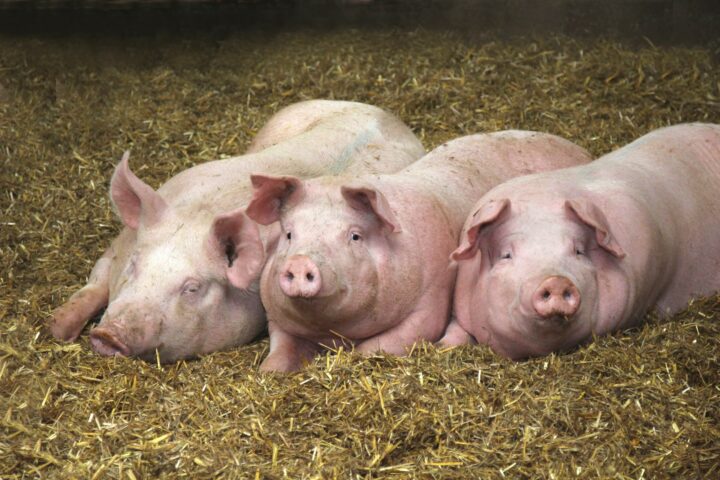
Popular Apple Varieties in Danger
The science magazine "Einstein" of Swiss Television has addressed the new breeding methods. The report clearly shows that there is no way around these new methods if Switzerland wants to continue cultivating popular apple varieties such as Gala, Braeburn, and Golden Delicious.
Tuesday, October 31, 2023
Our beloved apples are delicate plants. This is clearly shown in the report by SRF's science magazine, Einstein. Without plant protection, apple shelves in stores might largely remain empty. Apple blossom weevils and apple moths harm eating apples just as much as fungal diseases like scab or powdery mildew. So it's not surprising that apple farmers spray their plants with plant protection products several times a year. In organic farming, this reportedly happens twice as often as in conventional farming because the products used (especially sulfur and copper) are less effective.
Fire blight, a highly contagious bacterial disease that can destroy entire crops, is also a major concern. Since the ban on the use of antibiotics, there are only a few plant protection products available that are effective against the fire blight pathogen. Pests and fungi are constant challenges for apple growers. Climate change adds to this: neither the popular Gala apple, Braeburn, nor Golden Delicious can handle heat well. This is likely to have far-reaching consequences. To enable apple cultivation in our latitudes in the future, it is essential to breed more resistant plants. In the future, they must be better able to cope with heat, pests, and fungi. At the same time, consumers and politicians demand a continuous reduction of plant protection products used – while maintaining product quality, of course. Time is of the essence.
25 Years for a New Apple
It is a massive challenge to find timely solutions for the pressing problems, as shown in the Einstein report. Because breeding a resistant, tasty apple with traditional methods is a lengthy process: it takes 25 years or more before a new, resistant variety is potentially marketable. Resistance is just one of many breeding objectives: New varieties should taste good, look appetizing, have a long shelf life, be transportable, and so on. Given this, it is incomprehensible that there is no progress in Switzerland regarding the approval of new genomic breeding methods. The Einstein report impressively demonstrates the potential of these technologies. By making minimal changes to the plant's genome, either desired resistances could be introduced into existing, popular apple varieties, or unwanted characteristics that promote diseases could be switched off. Unlike conventional breeding methods, it would not take decades to reach market maturity, but "only" a few years. And consumers wouldn't have to give up their favorite apple varieties. Moreover, tools would be available to quickly respond to new challenges. Bruno Studer, Professor of Molecular Plant Breeding at ETH Zurich, explains in the report the possibility of combining different resistance mechanisms using cisgenetics and genome editing to develop more long-lasting resistances. This would significantly reduce the use of necessary plant protection products.
Consumers See the Benefits
The advantages of the new breeding methods are obvious. And the brief survey at the end of the Einstein report shows that many consumers are quite open to apples produced with new methods: "If the whole thing is scientifically tested and safe, I would choose the gene-edited apple," says a convinced father. One cannot disagree with him. And he is far from being the only one with this view, as a survey by gfs Bern also shows.
There is a Market for Genetically Modified Food in Switzerland
The NFP59 study, commissioned by the federal government from 2007 to 2011, on "the benefits and risks of genetically modified plants," already showed back then that there would be a market for products made with (notably classic) GMO in Switzerland if consumers truly had a choice. The study came to this conclusion through a large-scale market stand experiment. Market stands were set up in cities of both German-speaking and French-speaking Switzerland. The stands offered passers-by three types of cornbread available in both large and small versions. The cornbreads were made with three different types of corn ("organic," "conventional," and "genetically modified") and were clearly labeled. Almost 5000 loaves were sold to over 3000 consumers in total. The results were surprising because the GMO variety's market share was still over 20% when it was priced the same as the organic variety. For consumers, not only the price but also the actual type of bread was less relevant to their purchase decision than the size of the bread. So they cared more about whether it was a small or large loaf than whether it was made with organic or GMO corn. Furthermore, the study showed that at all five market stands, sales increased by 30% when consumers could choose not only between organic and conventional (control experiment) but also had the additional option of a labeled GMO cornbread. This finding contradicted the narrative that "consumers did not want GMOs." A cheeky, and not so scientifically conducted audience study, also came to the same conclusion: Syngenta offered beer brewed with Bt corn at the Swiss National Exhibition Expo 2002, which was very popular. Ironically, this was documented by Greenpeace in the Social Archive.
Kindly note:
We, a non-native editorial team value clear and faultless communication. At times we have to prioritize speed over perfection, utilizing tools, that are still learning.
We are deepL sorry for any observed stylistic or spelling errors.
Related articles

What’s Really in Your Shopping Basket
Genetic engineering in our shopping basket? Yes – and much more often than we think. Whether it’s pasta, bread or vegetables: many of the everyday products we consume come from mutation breeding, which involves altering the genome and is considered safe. It’s high time to debunk the common myths.

Genomic breeding methods are not given a chance to prove themselves
Modern genomic breeding methods are legally classified as genetic engineering – and are therefore still effectively blocked. Yet we have been eating genetically modified plants for decades, just under the label of “classical mutagenesis.” The new, more precise techniques are regulated more strictly than the old ones, even though they are considered safer from a scientific perspective. A contradiction that urgently needs to be corrected. The EU is setting a good example.

No Pig Business: Why Testicle-Free Boars Are a Clear Win for Animal Welfare
New breeding methods are opening up new possibilities in both plant and animal breeding. They allow targeted genetic changes that can make animals more resilient, adaptable, and healthier.

Stagnation instead of progress: Switzerland risks falling behind in new breeding techniques
An overview article in Schweizer Bauer shows how much the new breeding methods are preoccupying farming circles. Once the consultation process on the federal law has been completed, a bill is expected – then it will become clear whether there is actually the political will to approve it.

